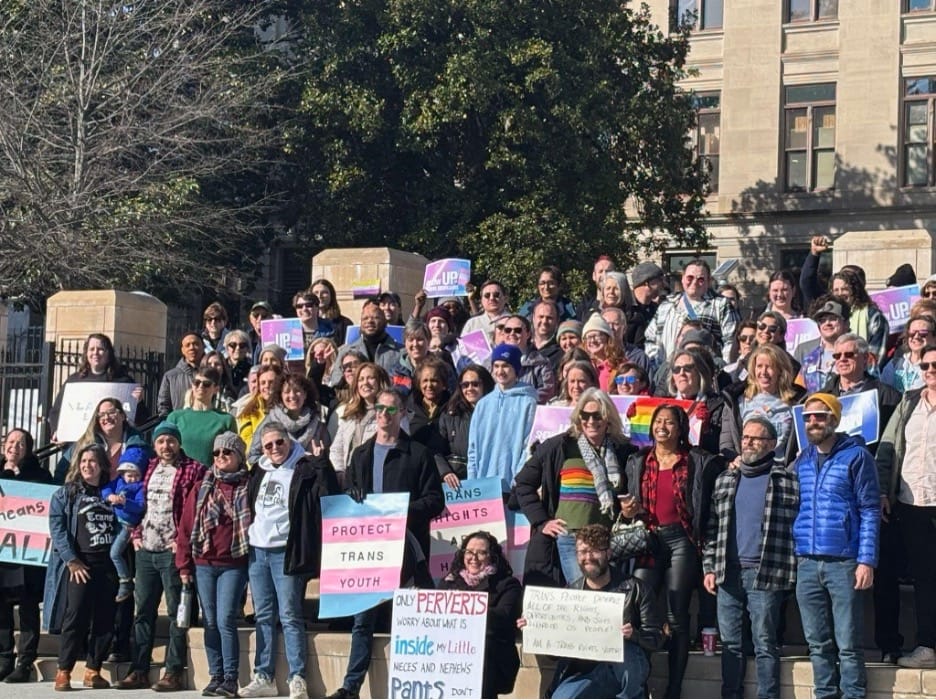On April 28, Georgia Gov. Brian Kemp signed The Riley Gaines Act, effectively banning the participation of transgender student-athletes from participating in sports and from using the correct restroom and locker room that aligns with their gender.
The new law, which was championed by conservative state lawmakers as a top priority at the start of the legislative session and supported by Kemp, takes the unprecedented step of targeting transgender student-athletes despite there being a record of zero transgender athletes currently competing in the state.
On March 4, for the second time since the start of the 2025 state legislative session, over 200 LGBTQ Georgians and their allies descended on the State Capitol to share their personal stories with lawmakers and to rally against legislation aimed at stripping transgender Georgians of their humanity and the right to live and play as every other citizen.
The new law also includes vague language about “standard school medical procedures” to enforce the measure and verify a student’s sex assigned at birth.
Research from The Inclusion Project shows that Georgia taxpayers would be billed for each verification, which is estimated at $10,000 or more per athlete, depending on the tests required and administrative costs. For cases where the outcome is disputed, which could require multiple tests, legal intervention, or genetic sequencing, costs could exceed $15,000 per athlete.
Sarah Kate Ellis, President and CEO of GLAAD, responded to the new law’s passage in a joint press release with state equality group Georgia Equality.
“All students, regardless of gender identity, should have access to play school sports in a safe environment where they can learn and thrive,” Ellis said.
“With the passage of this discriminatory legislation, Georgia lawmakers have unfairly and baselessly made it more difficult for transgender students to experience the same lessons sports offers all youth, and they have dangerously placed a target on cisgender girls who don’t fit neatly into societal expectations of gender. No one wins with legislation like this,” Ellis added.
“All Georgia students, families, and teams deserve leaders who protect everyone’s ability to belong and be safe.”
Disinformation Campaign
Original language from HB 267, also known as The Riley Gaines Act, which included a radical sex redefinition and would have applied broadly across the Georgia State Code, was not included in the final language of SB1, which combined language from both bills.
Riley Gaines, the bill’s namesake, is not from Georgia. She has parlayed her fifth-place finish at a Georgia event into a career of testifying nationwide to bar transgender youth as young as kindergarten from playing sports. Gaines has lobbied against the inclusion of trans women in the women’s division of sports, been a frequent guest on right-wing media, travels state to state and nationally for panels advocating against transgender people, and campaigned for anti-trans candidates for public office, including Rand Paul, Ron DeSantis, Kim Reynolds, Daniel Cameron, and others.
In a recent video posted on the Health and Human Services (HHS) website, Gaines continues to be used by the Trump Administration to spread further anti-transgender disinformation that fuels harmful anti-transgender legislation like SB1 in Georgia and in other statehouses nationwide.
“We know that SB1 will likely be weaponized against students—specifically as it relates to intersex individuals—but it could also be used against cisgender students who are accused of being transgender,” said Jeff Graham, executive director of Georgia Equality.
Graham, Georgia Equality, and a coalition of statewide equality groups successfully led efforts to block nearly 20 anti-LGBTQ bills during the 2024 legislative session.
“Anyone who loses can throw a tantrum, bring a lawsuit, or bully the champion simply for being deemed “too good” at their sport or for not meeting the stereotypes of what a girl should look like.”
Graham tells GLAAD that “despite many Georgians’ struggle with a high cost of living, healthcare access, and many other pressing issues, it is telling that leadership in the House and Senate chose to make this their number one priority. Sports serve to teach invaluable, lifelong lessons about teamwork, discipline, and hard work,” he added.
“We firmly believe that every person deserves the opportunity to benefit from these invaluable life lessons.”
GLAAD’s fact sheet on transgender participation in sports notes that women and girls face significant barriers in sports that have nothing to do with transgender inclusion: inequitable facilities, pay, and marketing; abusive coaches; and racist, sexist, and homophobic harassment are all serious problems that have frequently gone unaddressed by lawmakers.
Georgia advocates tell GLAAD that anti-LGBTQ legislation like The Riley Gaines Act is a “solution in search of a problem.” And while disappointment at the outcome is expected, Graham reminds advocates that this setback is not without precedence in the march toward full equality.
“We are fighting laws that want to take us backward. The challenges are real, but we’ve survived it all before,” Graham said in remarks given inside the State Capitol on March 4.
“We are the most resilient community imaginable. We will make sure that people have access to medical care. We will make sure that our young people have the support they need,” he added. “And we will eventually win these laws in Georgia and find a day when they stop coming after us.”













